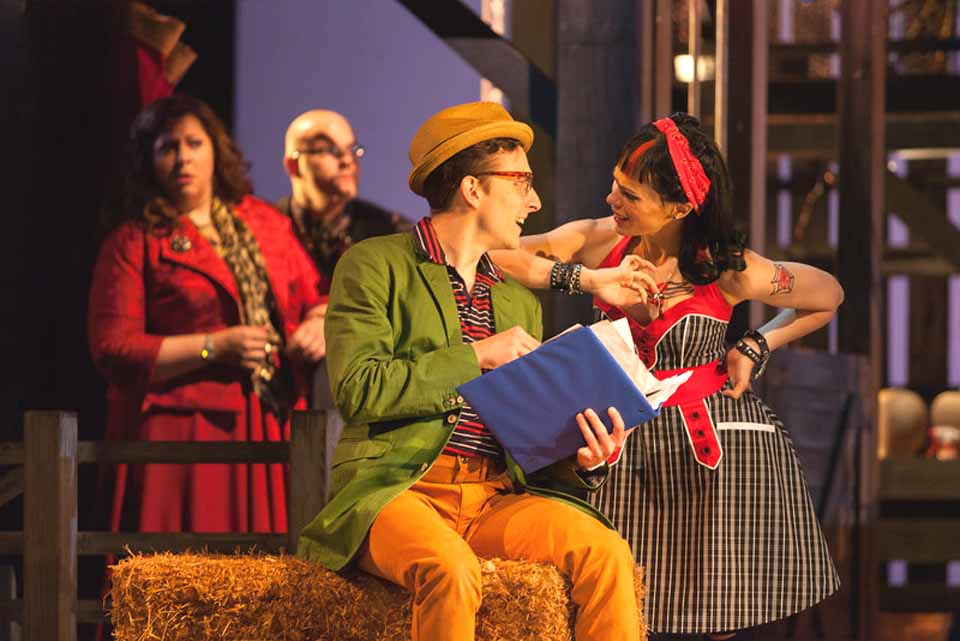OPERA REVIEWS: All 4 Productions
Rolled Out At Glimmerglass Festival
Cast of International Excellence In ‘Ariadne’
By ROBERT MOYNIHAN • allotsego.com

Richard Strauss’s “Ariadne auf Naxos,” auf Upstate German humor? Supposedly, it doesn’t exist outside Klink’s Stalag on aging TV. An oddity of reputation is that Germany, after two murderous conflagrations, may even now be wrongly cast.
Arecent book claims that most “higher things” in the U.S. came from France. Not so. Most of our higher musical culture came from Deutschland. German-speaking populations in major U.S. cities wanted their symphonies, operas.
They sponsored higher forms of literacy in urban libraries and museums. German was the most studied foreign language in America before 1917-18.
Richard Strauss has also suffered because of extremist violations in two wars – and is demoted in U.S. opera houses. His magnificent creation, ”Rosenkavalier,” is too expensive to be staged frequently. Besides, it features roving sexual identities.
Strauss’s own personality as a careful burgher also is disfavored. After the furor following his opera “Salome,” he calmly saidthat it didn’t matter – the profits built a comfortable mountain retreat. At the end of WW II, he copied single sheets of his scores and sold them toknowledgeable U.S. troops who did not confuse him with the Waltzkaiser.
This Upstate “Ariadne” is a highly humorous romp – a barnyard Glimmersetting with even a prize rooster (Malcolm) and live goat (Chopin).
Humans caper with antics of their own. The abstractions of mythology, though, confront the animalism of earthlings and their little three-letter word. As with “Rosenkavalier,” this simple term with its predictable activity moves to celebratory, even operatic hilltops.
This is a cast not merely with gifted singers – but with international excellence. Christine Goerke has a commanding voice, and it is thrilling to hear her in Otsego. Her first long aria about death however, also has its satiric edge.
Even with interruptions, it is of similar duration with Isolde’s love-death solo in Wagner’s “Tristan.” Strauss had a fixation about time values in performance: thus this highly amusing reference to Wagner is a long parody. The Tristan “chord” is also heard, even a reference to that work’s love-potion.
There’s reference to the “Flying Dutchman”’s ship – all with deft thematic touches. The coloratura’s Italianate solo is about the same length as Ariadne’s death lament, and it is balanced by the male’s conclusive singing in a satiric, overblown Wagnerian manner.
This sophisticated satire might have been noted in the program notes, which spend too much time on the sexually celebratory Zerbinetta, performed by the virtuoso-coloratura Rachele Gilmore.
However, the German libretto uses three synonyms for change without overtly dictating behavior. The mature Western European attitude is: Who cares? Any overly righteous scholastic language misses the humor and parody in this operatic romp.
Sopranos singing males (often an improvement) are amusingly ambiguous.
Making them “transcendent” removes that amusement. Kathleen Kelly’s conducting of the musical notes, however, was optimal, far surpassing any prescribed program.
As for other language, the Glimmer-translation of the elegant German original was dragged from the dull vat of platitudes. Briefly:
live it down/the nerve of you peoplelindulge any fancy randy goat/worst nightmare/stir the heart/elevate the soul/ply the trade/too good for this world/dark despair/I can’t help myself/sends chills down my spine/captivating tune/life has just begun/common trash/real class act/to move and inspire/there’s so much we don’t know/endless days/tickle their fancies/one & only/cut to ribbons/model of devotion/wrap them around my finger/we don’t speak the same language/hand in hand/face to face/time can heal all wounds
Tiring of these (there are many others), a reader-listener may consider “deep profundities” mixed with “long stretches” that are “sad to see.” However, “a moment passes quickly.” So should banal renderings of lively texts.

